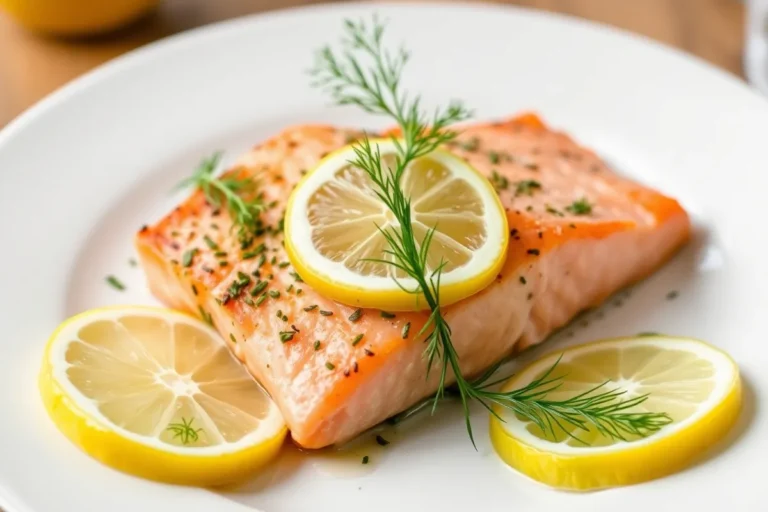Introduction to Lemon Herb Salmon
Lemon herb salmon is a culinary masterpiece that combines the rich, buttery flavor of salmon with the refreshing tang of lemon and the aromatic essence of herbs. Whether you’re preparing a family dinner or hosting a sophisticated gathering, this dish brings elegance and health benefits to the table.
Packed with nutrients, simple to prepare, and endlessly versatile, lemon herb salmon is the perfect choice for both amateur and seasoned cooks. Let’s explore why this dish deserves a place in your regular meal rotation.
Why Lemon Herb Salmon is a Healthy and Delicious Choice
The Nutritional Benefits of Salmon
Salmon is a nutritional powerhouse. As an excellent source of omega-3 fatty acids, it supports heart health, reduces inflammation, and promotes brain function. Additionally, salmon is rich in:
- Protein: Essential for muscle growth and repair.
- Vitamin D: Supports bone health and immunity.
- B Vitamins: Vital for energy production and metabolism.
Including salmon in your diet regularly can improve overall well-being. Learn more about the health benefits of omega-3-rich foods.
The Role of Lemon and Herbs in Enhancing Flavor
The combination of lemon and herbs transforms salmon into a zesty and aromatic delight. Lemon provides:
- Acidity: Cuts through the richness of salmon.
- Citrus Aroma: Adds freshness to every bite.
Meanwhile, herbs like dill, parsley, thyme, and basil offer distinct flavors that complement salmon’s natural taste. Using fresh herbs maximizes flavor and ensures a visually appealing dish.
Selecting the Perfect Salmon
Wild-Caught vs. Farmed Salmon: Key Differences
Choosing between wild-caught and farmed salmon can impact both flavor and nutrition.
- Wild-Caught Salmon: Known for its natural diet and superior omega-3 content, it has a firmer texture and a distinct flavor.
- Farmed Salmon: More accessible and affordable, with a milder taste, but may contain fewer omega-3s due to its diet.
Opt for wild-caught salmon when possible for a more nutritious and environmentally sustainable choice. Explore sustainable seafood sourcing options.
How to Identify Fresh Salmon
To ensure your dish turns out perfectly, select the freshest salmon available. Look for:
- Bright, Vibrant Color: Fresh salmon has a deep orange or pink hue.
- Firm Flesh: It should spring back when pressed gently.
- Minimal Odor: Avoid fish with a strong, unpleasant smell.
Essential Tools and Ingredients
Tools for Preparing Lemon Herb Salmon
Having the right tools makes preparation seamless. Essential items include:
- Sharp Knife: For cutting and deboning.
- Zester or Microplane: To grate lemon zest.
- Non-Stick Pan or Grill: Ensures even cooking and prevents sticking.
- Cooking Thermometer: For precise temperature control.
Fresh Herbs and Spices: Which Ones to Use?
Selecting the right herbs and spices elevates your salmon. Consider these combinations:
- Dill and Parsley: A classic pairing for a fresh, clean taste.
- Thyme and Rosemary: For a more robust, earthy flavor.
- Garlic and Paprika: Adds warmth and depth to your dish.
Always opt for fresh herbs when possible, as they release more aromatic oils during cooking.
Techniques for Cooking Lemon Herb Salmon
Preparing the Salmon: Step-by-Step
Mastering the preparation process is essential for achieving a flawless lemon herb salmon dish. Here’s a comprehensive guide to get started:
Cleaning and Deboning Tips
Before cooking, ensure your salmon is thoroughly cleaned and deboned.
- Rinse Gently: Use cold water to remove any debris, then pat dry with paper towels.
- Check for Bones: Run your fingers along the flesh to find any pin bones. Use tweezers or pliers to remove them.
- Trim Edges: Remove uneven or fatty edges for even cooking.
Proper preparation ensures a smoother texture and avoids unpleasant surprises during your meal.
Marinating Salmon for Maximum Flavor
Marinating your salmon infuses it with flavor while keeping it tender. For a classic lemon herb marinade, combine:
- Fresh Lemon Juice: Brightens and tenderizes the fish.
- Olive Oil: Adds richness and prevents sticking.
- Chopped Herbs (Dill, Parsley, or Thyme): Enhances the natural flavor.
- Minced Garlic and Black Pepper: For depth and a slight kick.
Marinate for 15–30 minutes in the refrigerator to allow the flavors to meld. Avoid over-marinating, as the acidity in lemon can break down the fish’s texture.
Cooking Methods for Lemon Herb Salmon
Baking: A Simple and Delicious Option
Baking is a foolproof method that yields tender, evenly cooked salmon. To bake:
- Preheat your oven to 375°F (190°C).
- Line a baking sheet with parchment paper.
- Place the marinated salmon skin-side down.
- Bake for 12–15 minutes, depending on thickness, until the internal temperature reaches 145°F (63°C).
Grilling: Achieving Smoky Perfection
Grilling imparts a smoky, charred flavor that complements the herbs and lemon. Steps include:
- Preheat your grill to medium-high heat.
- Oil the grates to prevent sticking.
- Grill the salmon skin-side down for 4–6 minutes per side.
Grilling works best for thicker cuts of salmon, as it holds up well to high heat.
Pan-Seared: A Quick and Flavorful Approach
For a crisp exterior and tender interior, pan-searing is ideal:
- Heat a non-stick or cast-iron skillet over medium heat.
- Add a tablespoon of olive oil or butter.
- Cook the salmon skin-side down for 3–5 minutes until crispy.
- Flip and cook for an additional 2–3 minutes.
Pan-searing locks in the juices, making it a favorite for quick meals.
Poached Salmon: Retaining Moisture and Flavor
Poaching is the gentlest cooking method, ideal for retaining moisture:
- Bring water or broth to a simmer in a deep pan.
- Add herbs, lemon slices, and a touch of salt.
- Gently lower the salmon into the liquid and cook for 8–10 minutes.
Poached salmon is perfect for light, health-conscious meals.
Timing and Temperature Tips
Avoiding Overcooked Salmon
Overcooking salmon can result in a dry, flaky texture. To prevent this:
- Use a cooking thermometer to check for doneness.
- Remove the salmon from heat when it reaches 135°F (57°C); residual heat will bring it to 145°F (63°C) as it rests.
Ensuring Even Cooking
To cook salmon evenly:
- Use cuts of similar size and thickness.
- Let salmon sit at room temperature for 10–15 minutes before cooking.
- Avoid overcrowding the pan or grill.
Serving, Pairing, and Variations of Lemon Herb Salmon
Serving Lemon Herb Salmon
Presenting lemon herb salmon in an appealing way elevates the dining experience. An elegant presentation enhances not only the visual appeal but also the perceived flavor of the dish.
Plating Techniques for an Elegant Presentation
- Use a White Plate: The vibrant orange-pink of the salmon and the green herbs pop against a white background.
- Layer Thoughtfully: Place the salmon at the center, add a side of vegetables or grains, and garnish with fresh herbs.
- Add a Sauce Drizzle: A light drizzle of lemon butter sauce or a dollop of herb-infused yogurt enhances flavor and adds sophistication.
Garnishing Ideas Using Fresh Herbs and Citrus
Garnishes add flair to the dish. Consider:
- Lemon Slices or Zest: For a citrusy aroma.
- Sprigs of Fresh Dill or Parsley: Adds color and complements the flavor.
- Edible Flowers: For a gourmet touch.
These simple touches make your dish restaurant-worthy.
Side Dishes to Complement Lemon Herb Salmon
Pairing salmon with the right sides creates a balanced, satisfying meal. Choose options that enhance its light, fresh flavors.
Light and Fresh Sides: Salads and Vegetables
- Mixed Green Salad: Toss with a lemon vinaigrette for a cohesive flavor profile.
- Roasted Asparagus or Broccoli: Adds a smoky, caramelized element.
- Sautéed Spinach or Kale: Brings a nutritious, earthy component.
Fresh, seasonal vegetables keep the meal light and nutrient-rich.
Starch Options: Rice, Quinoa, or Potatoes
For heartier meals, pair salmon with:
- Herbed Quinoa: Adds texture and a nutty flavor.
- Lemon Butter Rice: Complements the citrusy notes of the salmon.
- Garlic Mashed Potatoes: A creamy contrast to the flaky fish.
These options ensure a well-rounded plate.
Variations of Lemon Herb Salmon Recipes
Get creative with your lemon herb salmon by experimenting with different flavors and styles.
Adding a Spicy Kick with Chili Flakes
For those who enjoy heat, sprinkle red chili flakes into the marinade or garnish. The spiciness pairs well with the citrus and herbs, adding depth to the dish.
Honey-Lemon Herb Salmon: A Sweet Twist
Balance the tartness of lemon with a touch of honey:
- Add 2 tablespoons of honey to the marinade.
- The honey caramelizes during cooking, creating a sweet, sticky glaze.
This variation is perfect for those who prefer sweeter flavor profiles.
Mediterranean-Inspired Lemon Herb Salmon
Give your salmon a Mediterranean flair:
- Add capers, olives, and cherry tomatoes to the dish.
- Use Mediterranean herbs like oregano and basil.
- Serve with a side of couscous or a Greek salad.
This variation brings bold, tangy flavors to the table.
Storing and Reheating Leftovers
Proper storage and reheating ensure your salmon remains flavorful and safe to eat.
How to Store Cooked Salmon Safely
- Refrigeration: Place leftovers in an airtight container and refrigerate within 2 hours of cooking. Consume within 3–4 days.
- Freezing: For longer storage, wrap salmon tightly in foil or plastic wrap and place in a freezer-safe bag. Freeze for up to 3 months.
Reheating Without Losing Flavor
To avoid drying out your salmon:
- In the Oven: Reheat at 300°F (150°C) for 10–15 minutes, covered with foil to retain moisture.
- In a Pan: Heat on low with a splash of water or broth.
- In the Microwave: Use a microwave-safe dish, cover loosely, and heat in short intervals.
Reheating gently preserves the salmon’s texture and flavor.
More FAQs
1. Can I use frozen salmon for this recipe?
Yes, just ensure it is fully thawed and patted dry before use.
2. What are the best herbs for lemon herb salmon?
Dill, parsley, thyme, and basil are excellent choices.
3. Is lemon herb salmon suitable for meal prep?
Absolutely! Cook in batches and store for up to 4 days.
4. How can I make this dish dairy-free?
Use olive oil instead of butter in the marinade.
5. What wine pairs well with lemon herb salmon?
Try a crisp white wine like Sauvignon Blanc or Pinot Grigio.
6. Can I cook this dish without the skin?
Yes, but cooking with the skin helps retain moisture.
7. What’s the best way to zest a lemon?
Use a microplane or fine grater, avoiding the bitter white pith.
8. Can I grill salmon on a stovetop grill pan?
Yes, preheat the pan well and oil it lightly before use.
9. How can I add more protein to the meal?
Serve with a side of lentils or chickpeas.
10. Is it safe to eat salmon medium-rare?
Yes, if it’s sushi-grade or cooked to at least 125°F (52°C) internally.

